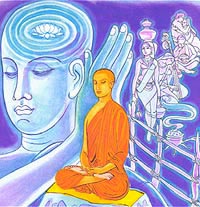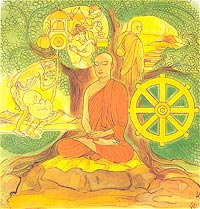13X12 Saturday LESSON 721 மூன்று கூடைகள் திபிதக![]() TIPITAKA from FREE ONLINE eNālāndā Research and Practice UNIVERSITY through http://sarvajan.ambedkar.org-Dhammapada Verse 385 Mara
TIPITAKA from FREE ONLINE eNālāndā Research and Practice UNIVERSITY through http://sarvajan.ambedkar.org-Dhammapada Verse 385 Mara
VatthuVerse 385. The Unfettered Person Is A Brahmana

The Unfettered Person Is A Brahmana
For whom is found no near or far,
for whom’s no near or far,
free of fear and fetter-free,
that one I call a Brahmin True.
Explanation: To him there is no further shore. To him there
is no near shore. To him both these shores are non-existent. He is
free of anxiety and is freed of bonds. That person I describe as a
Brahmana.
Dhammapada Verse 385
Mara
Vatthu
Yassa param aparam va
paraparam na vijjati
Vitaddaram visamyuttam
tamaham brumi brahmanam.
Verse 385: Him I call a brahmana who has for
him neither this shore (i.e., the sense-bases) nor the other shore (i.e., the
sense objects), and who is undistressed and free from moral defilements1.
1. ‘This shore’ and ‘the other shore’
are used in the sense of the internal and the external ayatanas. The internal
ayatanas are the sense bases, viz, the eye, the ear, the nose, the tongue, the
body and the mind; the external ayatanas are the sense objects, viz., visible
object, sound, odour, taste, touch and mind-object.
For a true Brahmana (i.e., arahat) there is
neither ‘this shore’ nor ‘the other shore’ which means that the senses of the
arahat are calmed, and his passions extinguished.
The Story of Mara
While residing at the Jetavana
monastery, the Buddha uttered Verse (385) of this book, with reference to Mara.
On one occasion, Mara came to the
Buddha disguised as a man and asked him, “Venerable Sir, You often say the
word ‘param’. What is the meaning of that word?” The Buddha, knowing that
it was Mara who was asking that question, chided him, “O wicked Mara!
The words ‘param’ and ‘aparam’ have nothing to do with you. ‘Param’ which means
‘the other shore’ can be reached only by the arahats who are free from moral
defilements.”
Then the Buddha spoke in verse as
follows:
| Verse 385: Him I call a brahmana who has for him neither this shore (i.e., the sense-bases) nor the other shore (i.e., the sense objects ), and who is undistressed and free from moral defilements. |
12X12 Friday LESSON 720 மூன்று கூடைகள் திபிதக![]() TIPITAKA from FREE ONLINE eNālāndā Research and Practice UNIVERSITY through http://sarvajan.ambedkar.org-
TIPITAKA from FREE ONLINE eNālāndā Research and Practice UNIVERSITY through http://sarvajan.ambedkar.org-
Dhammapada Verse 384 Sambahulabhikkhu
Vatthu-Cultivate Concentration

Verse 384. Cultivate Concentration
When by the twofold Dhamma
a Brahmin’s gone beyond
all the bonds of One-who-Knows
have wholly disappeared.
Explanation: When the brahmana - the seeker after the truth
- has understood the two states of concentration and insight through
and through, then in that person who knows these, all fetters wane,
diminish and fade
Dhammapada Verse 384
Sambahulabhikkhu
VatthuYada dvayesu dhammesu
paragu hoti brahmano
athassa sabbe samyoga
attham gacchanti janato.Verse 384: When the brahmana is
well-established in the two dhammas (i.e., the practice of Tranquillity and
Insight Meditation), then, in that knowing one, all fetters are destroyed.
The Story of Thirty Bhikkhus
While residing at the Jetavana
monastery, the Buddha uttered Verse (384) of this book, with reference to thirty
bhikkhus.On one occasion, thirty bhikkhus
came to pay homage to the Buddha. The Venerable Sariputta, seeing that time was
ripe and proper for those bhikkhus to attain arahatship, approached the Buddha
and asked a question, solely for the benefit of those bhikkhus. The question was
this: “What are the two dhammas?” To this the Buddha replied, “Sariputta!
Tranquillity and Insight Meditation are the two dhammas.”Then the Buddha spoke in verse as
follows:
Verse 384: When the
brahmana is well-established in the two dhammas (i.e., the practice of
Tranquillity and Insight Meditation), then, in that knowing one, all
fetters are destroyed.At the end of the discourse all
the thirty bhikkhus attained arahatship.